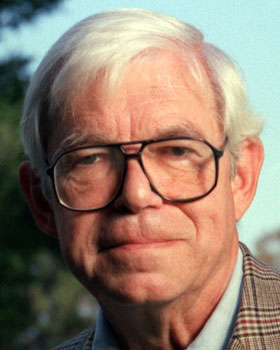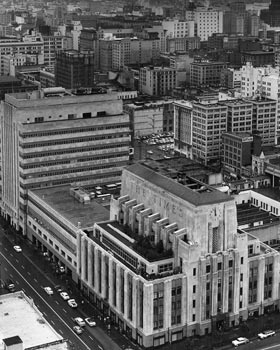Charles Champlin
When he retired from the Los Angeles Times, where he was arts editor from 1965 to 1991, Charles Champlin said he'd probably written more than 2 million words for the newspaper.
"In my working days as a magazine and newspaper writer, I had lunch 'out' as many as five days a week," he wrote in 2001 when his book about the loss of his eyesight, "My Friend, You Are Legally Blind," was released. "I never kept count of the interview lunches I conducted at the grand old Brown Derby on Vine Street, at Musso & Frank over on Hollywood Boulevard, at the smoke-filled Redwood Restaurant a few doors from The Times, or, depending on the grandeur of the interviewee, in the Polo Lounge or on the terrace at the Beverly Hills Hotel."
He estimated that he saw 250 movies a year in his 13 years as film critic.
Over the years, he got to know many of the biggest stars in Hollywood well. One example can be found in his account of being called by Katharine Hepburn to the set of Spencer Tracy's final film, "Guess Who's Coming to Dinner" (1967).
Champlin wrote in an appreciation of Hepburn when she died in 2003: "During the shooting of Spencer Tracy, Hepburn sent a message, urging me to come by and watch Tracy work, because she thought he was giving such a magnificent performance.
"On a hot June morning in 1967, I went to the Columbia Studios on Gower Street. Hepburn's secretary came to meet me and explained that the shooting schedule had been changed so that Tracy was about to do the film's climactic scene.
"Obviously, the hope was to get on film Tracy's important scene while his health still held up. I started to leave but, at Hepburn's insistence, I stayed — in the wings so that Tracy wouldn't be distracted by my presence.
"The scene was the moment when Tracy speaks to the two assembled families: Sidney Poitier and his parents and Hepburn and the daughter Poitier hopes to marry.
" 'If you two love each other as much as her mother and I have loved each other,' Tracy said, they would be able to handle the difficulties of an interracial marriage.
"For a long moment nobody could speak. It was profoundly moving because it seemed so clear to everyone on the soundstage that he was speaking of his love for Hepburn. It is still impossible to watch the scene without feeling a strong emotional tug."
Related stars
|
|



Two thoughts about Charles Champlin
Share a thought about Charles Champlin